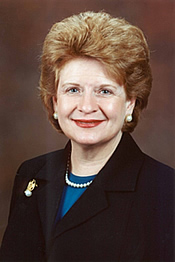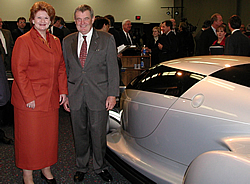Senator Debbie Stabenow - Driving Issues That Matter
By
Patti Schmidt
What
drives Michigan's Senator?
Well, usually staffers, but when Senator Debbie
Stabenow is in Washington, a Cadillac Catera is her
automobile of choice, and in Michigan, it's an Olds
'98. But what really drives the Great Lakes state's
first female Senator is her passion for people, a
long-term commitment to causes, and a keen desire
to get things done.
Catch up with Michigan's U.S. Senator, Debbie Stabenow,
as she battles pharmaceutical and insurance companies,
violence against women, the system and long hours.
|
 In
late 2000, when Michigan's Democratic Senator Debbie Stabenow
had finally gotten through a bitter campaign in which her
Republican opponent called her "Little Debbie" and
outspent her nearly two-to-one, she should have gone on vacation. In
late 2000, when Michigan's Democratic Senator Debbie Stabenow
had finally gotten through a bitter campaign in which her
Republican opponent called her "Little Debbie" and
outspent her nearly two-to-one, she should have gone on vacation.
But
she'd promised to make the pharmaceutical industry lower prescription
drug prices, to maintain Social Security benefits and to
give Medicare a new prescription drug plan. Before she was
even sworn in, Stabenow had pledged to solve Congress' three
toughest topics and fight the pharmaceutical and insurance
industries — the two industries that spend the most money
lobbying federal officials.
The
non-profit, public interest organization Public Citizen reported
in 2000 that the drug industry spent more than any other —
$235.7 million-lobbying federal officials between 1997 and
1999. Millions more were spent on advertising and campaign
contributions to friendly Congressional committees, candidates
or causes. The insurance industry is usually second.
"The
pharmaceutical industry is making up to 20 percent net profit
each year, unfortunately on the backs of families, seniors
and businesses," Stabenow said. "There are six prescription
lobbyists for every U.S. Senator. So we're going to create
a coalition where individuals, seniors, families, businesses,
farmers — everybody that's affected — can join together and
solve
the problem."
"In
the last election, I think the pharmaceutical industry spent
more campaigning against her than any other candidate,"
said Stabenow's spokesperson Dave Lemmon. "She was enemy
number one."
Stealing
the show
If her willingness to wage war wasn't enough to prove her
pluck, this was: when she met the Washington press corps during
her first press conference, Stabenow unhesitatingly answered
a question directed at Senate Democratic Leader Thomas A.
Daschle of South Dakota.
Gabe
Martinez, a reporter from the Detroit News' Washington bureau,
reported that Stabenow explained, "I didn't mean to interrupt,"
to the amused press and a surprised Daschle. Then she explained
how women — in the Senate and in their kitchens — can help
make better choices for families, the economy and schools.
She
stole the show. That's quite a feat, considering she was surrounded
by eight other, freshly sworn-in Senators, including Senator
Hillary Rodham Clinton, and party leaders from both sides
of the aisle.
"It's
rare for her to shy away from an opportunity to weigh in on
an issue she campaigned on, or was elected on," Lemmon said. "She thought the question was for her."
Senator
Daschle said afterward that he remembered a pre-election prediction
made by House Democratic Leader Richard Gephardt, who told
him, "Debbie Stabenow is going to win her race, and you're
going to consider her the MVP in the first year."
"He
was right," Daschle said.
Others
took notice, too: the December 2001/January 2002 issue of
George Magazine named Stabenow one of "10 Powerhouses
Who Really Rule Today's Divided America."
Influential
appointments
Stabenow wasn't a stranger to governing — at age 25, she dug
her husband's campaign signs out to run against the man who'd
beaten him a year before so she could help keep the county's
only nursing home open. At 27, she became the youngest chair
of the Ingham County Board of Commission. She was elected
to the Michigan House of Representatives and state Senate
before being elected to Congress in 1996, and to the Senate
in late 2000. Stabenow is only the second woman to have served
in both houses of the state legislature, and in both houses
of the national legislature.
Well
versed in bipartisan politics, sticky legislative issues and
male-dominated political bodies, she was able to accrue an
unusual amount of influence for a freshman senator. She was
assigned to committees that let her legislate agriculture
and aging, banking and housing issues. But her best assignment
— and where she made her mark — is the Budget Committee.
First,
she dedicated herself to listening to 16 hearings. When the
Senate budget debate began, she devoted a week to button-holing
moderate Republicans and helping Democrats set priorities
for education and a Medicare prescription drug benefit.
Stabenow
showed she was a bona fide member of the Centrist Coalition,
moderate Democrats and Republicans who try to put aside party
politics and get things done. Although she argued with Sen.
Susan Collins (R-Maine), and was just three votes short of
adding a $13.3 billion amendment to the budget for home health
care, she supported Collins' alternative rather than her own.
Her
reward — for hard work and bipartisanship — came when the
Budget Committee's top Democrat, Sen. Kent Conrad of North
Dakota, asked her to help manage the Democratic floor debate
on the budget.
"That's
highly unusual for someone of her length of service in the
Senate," said Conrad. "[I appointed
her] because of her performance in the budget committee and
her knowledge."
She
also was appointed head of a Democratic prescription drug
task force and head of the Women's Senate Network.
Commitment
to women's issues
Stabenow's commitment to women's issues led her to use her
2000 Congressional pay raise to buy whistles for young girls
in an area that suffered a rash of assaults.
When
she mentions she's been championing women's issues for more
than 25 years, she laughs and says, "I must have been
five when I started."
"When
I chaired the Ingham County Board of Commissioners, I asked
the Sheriff's Dept. to report on domestic violence incidences
in the county. They didn't keep statistics then, so we [began]
hearings and task forces, and we pulled together advocacy
groups and law enforcement. We developed one of the first
two domestic violence shelters in Michigan. It's still there
in Ann Arbor — and it's something I'm very proud of."
The
move was so controversial then, people blamed her for "breaking
up families" and "trying to take wives away from
husbands." Now, she says, "when my male colleagues
want to demonstrate their concern for women, domestic violence
is one of the first issues they talk about."
"We've
come a long way," she said. "We've got
shelters all over the country, extensive training programs
for law enforcement officials and better laws."
Now
the challenge is rape and sexual assault, she believes, particularly
date rape or assault by someone familiar.
"I
have a 22-year-old daughter, so I'm concerned," says Stabenow. "Young women her age are afraid to report [such
things]."
"So
we have to make it very clear that when a woman is a victim
of violence, it's not her fault," Stabenow said.
"And the people around her must respond supportively;
we must ensure that law enforcement and the system don't victimize
her further."
She
believes most violence stems from family violence. "The
most important message comes from a child's own home,"
she says. "Then there are the violent images on TV and
movies. I think we've created a level of tolerance for violence
that should be very unacceptable. We need to change the messages
our children receive."
Such
commitment earns her life-long supporters.
"Tricia
and Calvin Luker did a commercial for me during the campaign
which talked about what happened to their daughter — she had
problems with an HMO and she died," remembers Stabenow.
"I'd promised them that I'd take Jessica's picture with
me to the Senate and keep it on my desk until we passed the
Patient's Bill of Rights. We did pass it, but it's not become
law yet. I still have the photo on my desk, and I think one
of the most touching moments for me was when Calvin and Tricia
came in after we passed the bill — they were so excited, they
really felt that this was something that they'd helped to
get done."
D.C.
surprises
Despite her previous experiences, Washington had a few surprises.
"The process didn't surprise me, you know, I'd been
exposed to the legislative process before. The surprise was
the incredible volume of work and lack of time," she
said. "Fortunately, my children are 22 and 26, and so
they're out and about," she said. "I've learned
to be extremely organized in order to protect some personal
time."
In
those few hours when she's not working, you're likely to find
Stabenow listening to music, playing the piano or strumming
away on a guitar.
"I
love music!" she says enthusiastically. "I played
clarinet in high school, and I had eight years of piano lessons.
I'm a so-so guitar player, but a decent piano player."
Her
favorite entertainer would have to be Barbra Streisand, but
Bonnie Raitt is a close second. The Senator also likes show
tunes, and remembers every word on Carole King's Tapestry album. She also likes to sing blues and folk tunes.
"Music
is one of the important pieces in my life," she says,
mostly because it offers her peace and relaxation, things
a busy Senator often finds in short supply.
 |
| Stabenow
with Jack Smith, General Motors CEO |
Driving
Stabenow says getting behind the wheel is a treat.
"I
love to drive. I'm a born-and-bred Michiganian, home of the
automobile," she said. "When it's business, someone
drives me so I can work. But I love to get out and go. I have
a Cadillac Catera in Washington, and I have an Olds '98 —
which they're no longer making but I love — in Michigan."
The Senator has driven Oldsmobiles for decades.
"My
father and grandfather had a small Olds/Cadillac dealership
in Clare, so I practically grew up on a car lot," Stabenow said. "Later, I usually got a beat-up used car.
But I always had a car, so I've been partial to Oldsmobiles,
although I really like the Catera."
Staffers
point out that she rarely relaxes, due to a crazy
schedule that too often includes seven days of meetings. Staffers
often drive frantically between them, feeding her facts and
figures on the way.
"I
like to say yes, and meet with everybody," she'll tell
you.
"She's
one of those people who gets energy from other people,"
explains spokesman Dave Lemmon. "As the day goes on —
as she goes through more meetings and meets with more people
— she gets more energy. Some people tend to wind down as the
day goes on, but her energy continues to build. It's great
for someone in her line of work."
Stabenow
says, "The real challenge isn't the workload or the time
crunch, though, it's representing nine million people in a
very diverse state."
Travel...and
that crazy commute
A lifelong Michigan resident, Stabenow flies round-trip between
Lansing and DC each week, leaving Washington Friday afternoon
and returning to the Hill for work on Monday afternoon.
She
travels light, keeping a small essentials bag permanently
packed and clothes in both places. She uses the time during
the flights to read, write or "do homework."
"I
really feel it's important to view this job as a long-distance
commute to work," she says. "I live in Michigan
— it's my home." |